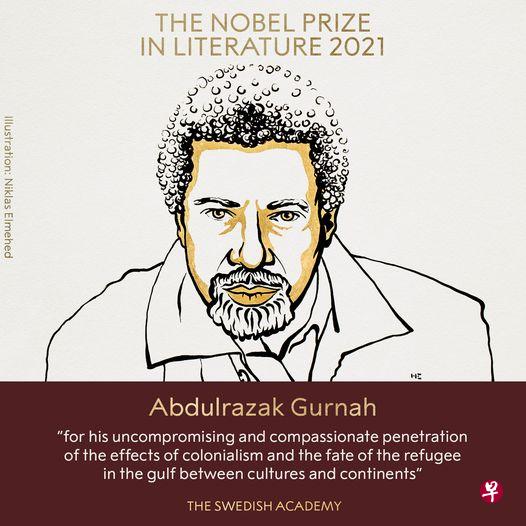
Fang (Winnie) Schreck | United Real Estate
Tel: 551-580-4856 | Email: F.WINNIE.S@GMAIL.COM
坦桑尼亚小说家古纳获颁2021年诺贝尔文学奖
文 / 林煇智
10/07/2021

(早报讯)瑞典学院将2021年诺贝尔文学奖授予坦桑尼亚小说家阿卜杜勒扎克·古纳(Abdulrazak Gurnah),以表彰他在文学上的成就。
法新社报道,瑞典学院说,古纳在桑给巴尔岛长大,但在20世纪60年代末作为难民来到英国,”由于他对殖民主义的影响以及文化和大陆之间的鸿沟中的难民的命运进行了毫不妥协和富有同情心的渗透”而受到表彰。古纳以英文写作,知名作品包括《天堂》。
瑞典人诺贝尔在1895年11月27日写下遗嘱,捐献全部财产3122万余瑞典克朗设立基金,每年把利息作为奖金,授予“一年来对人类作出最大贡献的人”。
根据他的遗嘱,瑞典政府于同年建立“诺贝尔基金会”,负责把基金的年利息按五等分授予,文学奖就是其中之一。
文学奖是颁给在文学方面创作出具有理想倾向的最佳作品的人,该奖项由瑞典学院从1901年起颁发,截至2020年,已有117人获此殊荣。
Abdulrazak Gurnah wins the 2021 Nobel prize in literature
Zanzibari novelist becomes first black African writer in 35 years to win prestigious award
By Alison Flood
10/07/2021

The Nobel prize in literature has been awarded to the novelist Abdulrazak Gurnah, for his “uncompromising and compassionate penetration of the effects of colonialism and the fate of the refugee in the gulf between cultures and continents”.
Gurnah grew up on one of the islands of Zanzibar before fleeing persecution and arriving in England as a student in the 1960s. He has published 10 novels as well as a number of short stories. Anders Olsson, chair of the Nobel committee, said that the Gurnah’s novels – from his debut Memory of Departure, about a failed uprising, to his most recent, Afterlives – “recoil from stereotypical descriptions and open our gaze to a culturally diversified East Africa unfamiliar to many in other parts of the world”.
No black African writer has won the prize since Wole Soyinka in 1986. Gurnah is the first black writer to win since Toni Morrison in 1993.
Gurnah’s fourth novel, Paradise, was shortlisted for the Booker prize in 1994, and his sixth, By the Sea, was longlisted in 2001. Olsson said that Paradise “has obvious reference to Joseph Conrad in its portrayal of the innocent young hero Yusuf’s journey to the heart of darkness”.
“[Gurnah] has consistently and with great compassion penetrated the effects of colonialism in East Africa, and its effects on the lives of uprooted and migrating individuals,” Olsson told journalists in Stockholm.
Gurnah, who was in the kitchen when he was informed of his win, said that he believed it was a wind-up.
“I thought it was a prank,” he said. “These things are usually floated for weeks beforehand, or sometimes months beforehand, about who are the runners, so it was not something that was in my mind at all. I was just thinking, I wonder who’ll get it?”
“I am honoured to be awarded this prize and to join the writers who have preceded me on this list. It is overwhelming and I am so proud.”
His longtime editor, Alexandra Pringle at Bloomsbury, said Gurnah’s win was “most deserved” for a writer who has not previously received due recognition.

“He is one of the greatest living African writers, and no one has ever taken any notice of him and it’s just killed me. I did a podcast last week and in it I said that he was one of the people that has been just ignored. And now this has happened,” she said.
Pringle said Gurnah had always written about displacement, “but in the most beautiful and haunting ways of what it is that uproots people and blows them across continents”.
“It’s not always asylum seeking, it can be so many reasons, it can be trade, it can be commerce, it can be education, it can be love,” she said. “The first of his novels I took on at Bloomsbury is called By the Sea, and there’s this haunting image of a man at Heathrow airport with a carved incense box, and that’s all he has. He arrives, and he says one word, and that’s ‘asylum’.”
Pringle said Gurnah is as important a writer as Chinua Achebe. “His writing is particularly beautiful and grave and also humorous and kind and sensitive. He’s an extraordinary writer writing about really important things.”
Afterlives, published last year, tells the story of Ilyas, who was stolen from his parents by German colonial troops as a boy and returns to his village after years fighting in a war against his own people. It was described in the Guardian as “a compelling novel, one that gathers close all those who were meant to be forgotten, and refuses their erasure”.
“In Gurnah’s literary universe, everything is shifting – memories, names, identities. This is probably because his project cannot reach completion in any definitive sense,” said Olsson. “An unending exploration driven by intellectual passion is present in all his books, and equally prominent now, in Afterlives, as when he began writing as a 21-year-old refugee.”Afterlives by Abdulrazak Gurnah review – living through colonialismRead more
Maya Jaggi, critic and 2021 Costa Prize judge said: “Gurnah, whom I first interviewed for the Guardian in 1994, is a powerful and nuanced writer whose elliptical lyricism counters the silences and lies of imperial history imposed when he was a child in east Africa. His subtle oeuvre is as robust about the brutal flaws of the mercantile culture he left as the atrocities of British and German colonialism, not least during the first world war, and the ‘random acts of terror’ he experienced as a black person in Britain – converting them into a comic triumph in his 1988 novel Pilgrims Way.”
Gurnah was born in 1948, growing up in Zanzibar. When Zanzibar went through a revolution in 1964, citizens of Arab origin were persecuted, and Gurnah was forced to flee the country when he was 18. He began to write as a 21-year-old refugee in England, choosing to write in English, although Swahili is his first language. His first novel, Memory of Departure, was published in 1987. He has until recently been professor of English and postcolonial literatures at the University of Kent, until his retirement.
Worth 10m Swedish krona (£840,000), the Nobel prize for literature goes to the writer deemed to be, in the words of Alfred Nobel’s will, “the person who shall have produced in the field of literature the most outstanding work in an ideal direction”. Winners have ranged from Bob Dylan, cited for “having created new poetic expressions within the great American song tradition”, to Kazuo Ishiguro “who, in novels of great emotional force, has uncovered the abyss beneath our illusory sense of connection with the world”.According to Ellen Mattson, who sits on the Swedish Academy and the Nobel committee: “Literary merit. That’s the only thing that counts.”
The Nobel winner is chosen by the 18 members of the Swedish Academy – an august and mysterious organisation that has made efforts to become more transparent after it was hit by a sexual abuse and financial misconduct scandal in 2017. Last year’s prize went to the American poet Louise Glück – an uncontroversial choice after the uproar provoked by the Austrian writer Peter Handke’s win in 2019. Handke had denied the Srebrenica genocide and attended the funeral of war criminal Slobodan Milošević.
The Nobel prize for literature has been awarded 118 times. Just 16 of the awards have gone to women, seven of those in the 21st century. In 2019, the Swedish academy promised the award would become less “male-oriented” and “Eurocentric”, but proceeded to give its next two prizes to two Europeans, Handke and Polish writer Olga Tokarczuk.
诚招美国和加拿大法律服务代理
因公司发展需要,诚招美国和加拿大法律服务代理。
要求:
懂英语、或西班牙语、或法语。
能合法工作有社安号或工号。
无需改行, 可以兼职。
大学生和有销售经验优先考虑。
自雇生意公司发美国报税1099,加拿大T4A
有意了解详情, 请扫码加微信, 非诚勿扰!



